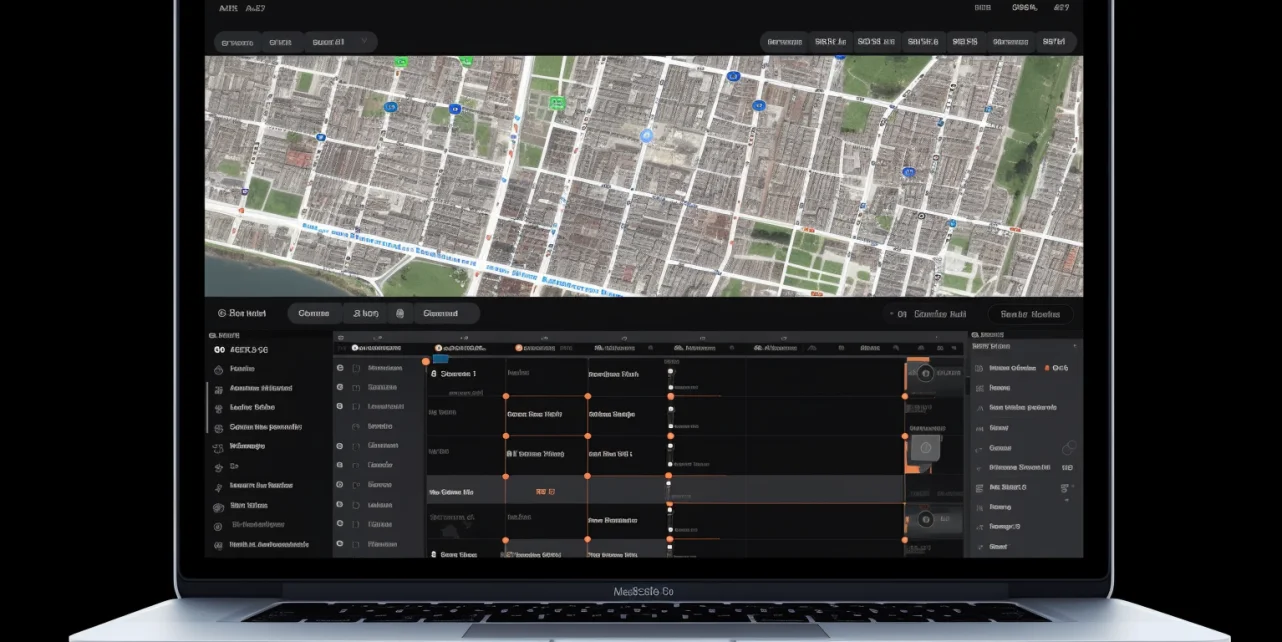Location-based scheduling means creating and managing schedules based on the physical location of tasks and resources. It involves using real-time location data to optimize the distribution of work and resources, resulting in increased efficiency and productivity.
This type of scheduling is particularly useful in industries such as logistics, transportation, and construction, where tasks and resources are constantly moving between different locations. By having access to real-time location data, businesses can better assign tasks and resources to the right locations, avoiding unnecessary delays and bottlenecks.
One of the main benefits of location-based scheduling is its ability to reduce travel time and distance between tasks. By having a clear understanding of where resources and tasks are located at any given time, businesses can plan routes and schedules that minimize travel time and distance, thus saving on fuel costs and reducing the carbon footprint.
Moreover, location-based scheduling allows for better coordination between tasks and resources. For example, in the construction industry, workers, equipment, and materials need to be in the right place at the right time for a project to progress smoothly. Location-based scheduling allows managers to track the progress of different tasks and efficiently allocate resources to ensure that everything is on schedule.
Another advantage of this scheduling method is its ability to adapt to changes quickly. In industries where tasks and resources are constantly on the move, unexpected delays or changes in priorities can occur. With location-based scheduling, managers can receive real-time updates on the location of resources and tasks and make necessary changes to the schedule to ensure that everything continues to run efficiently.
In conclusion, location-based scheduling offers a range of benefits for businesses that rely on mobile tasks and resources. By using real-time location data, businesses can optimize their schedules, reduce travel time and distance, improve coordination, and quickly adapt to changes, resulting in increased efficiency and productivity.
Benefits of Location-Based Scheduling in Logistics and Transportation Industry
Location-based scheduling is a valuable tool for businesses operating in the logistics and transportation industry. This method of scheduling has the potential to bring significant improvements to operations, resulting in cost savings, improved efficiency, and increased customer satisfaction.
One of the main benefits of location-based scheduling in the logistics and transportation industry is its ability to optimize routes and schedules. By using real-time location data, businesses can plan the most efficient routes for deliveries and shipments, reducing travel time and distance. This not only saves on fuel costs but also ensures that goods are delivered to their destination on time, improving customer satisfaction.
In addition, location-based scheduling allows for better coordination between different modes of transportation. In the logistics industry, goods may need to be transported by different modes, such as trucks, trains, and ships. By having real-time location data, managers can track the progress of each mode and make necessary adjustments to ensure that the goods are delivered to their destination efficiently.
Another benefit of location-based scheduling in the logistics and transportation industry is improved asset management. Businesses can track the location of their vehicles, equipment, and shipments, ensuring that they are being utilized effectively. This can help reduce the risk of theft or loss of goods and also improve overall asset utilization and productivity.
Furthermore, location-based scheduling allows for quick adaptability to unexpected changes. In the transportation industry, delays and accidents can occur, causing disruptions to schedules. With location-based scheduling, businesses can quickly make necessary changes to routes and schedules to minimize the impact of these disruptions, ultimately reducing costs and improving efficiency.
How Construction Companies Can Optimize Efficiency with Location-Based Scheduling
Construction companies face various challenges when it comes to scheduling and managing tasks on job sites. With multiple tasks and resources constantly moving between different locations, it can be challenging to optimize schedules and ensure that projects are completed on time and within budget. This is where location-based scheduling can be a game-changer for construction companies.
By using real-time location data, construction companies can efficiently manage their schedules and resources, resulting in increased efficiency and productivity. This method of scheduling offers several benefits for the construction industry, such as reducing travel time and distance between tasks, improving coordination, and adapting to changes quickly.
One of the main advantages of location-based scheduling for construction companies is its ability to minimize travel time and distance. By having access to real-time location data, managers can plan the most efficient routes for workers and equipment, saving on fuel costs and reducing the carbon footprint of the construction project. This also helps in minimizing delays and disruptions due to traffic or road closures.
Moreover, location-based scheduling allows for better coordination between tasks and resources. Construction projects require various tasks to be completed in a specific order, and any delays or disruptions can have a significant impact on the overall project timeline. With real-time location data, managers can efficiently allocate resources to different locations and track progress to ensure that everything is on schedule. This can help prevent bottlenecks and improve overall project efficiency.
Another benefit of location-based scheduling for construction companies is its adaptability to changes. Inevitably, unexpected delays or changes in priorities can occur in the construction industry. By using location-based scheduling, managers can receive real-time updates on the location of workers and equipment and make necessary changes to the schedule to keep the project on track.
Real-Time Updates: The Key to Successful Location-Based Scheduling
Real-time updates are crucial for the success of location-based scheduling. This method of scheduling relies on real-time location data to optimize schedules and efficiently manage resources. Without constant updates on the location of tasks and resources, businesses cannot fully utilize the potential of location-based scheduling.
One of the main advantages of real-time updates is its ability to optimize schedules. By knowing the exact location of tasks and resources, managers can plan the most efficient routes and schedules, reducing travel time and distance. This can save on operational costs and ensure that tasks and resources are in the right place at the right time.
Moreover, real-time updates allow for quick adaptability to changes. In industries where tasks and resources are constantly on the move, unexpected delays or changes in priorities can happen. With real-time updates, businesses can receive instant notifications of changes in location and make necessary adjustments to the schedule. This ensures that everything continues to run smoothly and efficiently, even in the face of unexpected events.
Furthermore, real-time updates enable better coordination between tasks and resources. In industries such as logistics, transportation, and construction, tasks often rely on resources in different locations. With real-time updates, managers can track the progress of each task and allocate resources accordingly to ensure that everything stays on schedule. This improves overall project efficiency and reduces the risk of delays or bottlenecks.
Reducing Travel Time and Distance: How Location-Based Scheduling Can Save Costs for Businesses
Reducing travel time and distance is a key factor in optimizing efficiency and saving costs for businesses. This is where location-based scheduling can be a valuable tool, enabling businesses to plan and manage schedules based on the real-time location of tasks and resources.
One of the main benefits of location-based scheduling is its ability to reduce travel time and distance. By having access to real-time location data, businesses can plan the most efficient routes and schedules for tasks and resources.
Moreover, reducing travel time and distance can also have a positive impact on the environment. By optimizing routes and schedules, businesses can lower their carbon footprint and contribute to sustainable practices. This not only benefits the environment but also improves the reputation of the company among environmentally-conscious consumers.
Another advantage of location-based scheduling in reducing travel time and distance is its ability to minimize the risk of delays and disruptions. Businesses can plan for potential delays and avoid bottlenecks. This helps prevent costly downtime and keeps operations running smoothly.
Location-Based Scheduling: A Game-Changer for Businesses with Mobile Tasks and Resources
Location-based scheduling offers various benefits for businesses that rely on mobile tasks and resources. By using real-time location data, businesses can optimize their schedules, reduce travel time and distance, improve coordination, and quickly adapt to changes, resulting in increased efficiency and productivity.
One of the main advantages of location-based scheduling is its ability to reduce travel time and distance between tasks. Moreover, location-based scheduling allows for better coordination between tasks and resources, preventing delays or bottlenecks.
The adaptability of location-based scheduling is also a crucial factor for businesses with mobile tasks and resources. Businesses can quickly make necessary changes to schedules in response to unexpected events.
In addition, location-based scheduling offers significant cost savings for businesses. By optimizing routes and schedules, businesses can save on operational costs such as fuel, labor, and maintenance. This not only improves the bottom line but also contributes to sustainable practices by reducing the carbon footprint.
Key Takeaways
– Location-based scheduling involves creating and managing schedules based on the physical location of tasks and resources.
– This method of scheduling offers various benefits such as reducing travel time and distance. Improving coordination and adaptability, and reducing costs for businesses.
– It is particularly useful in industries such as logistics, transportation, and construction.
– Real-time updates are crucial for the success of location-based scheduling as they provide the necessary information to optimize schedules and manage resources efficiently.
– By reducing travel time and distance, businesses can save on operational costs and contribute to sustainable practices.
– Overall, location-based scheduling is a game-changer for businesses with mobile tasks and resources, improving efficiency, productivity, and cost savings.







